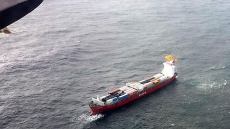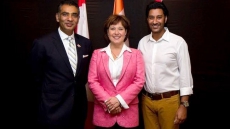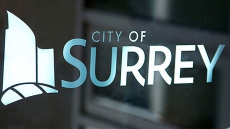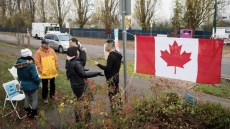OTTAWA - Justin Trudeau projects the image of a self-assured, impeccably turned-out, celebrity heart throb. But it wasn't always that way.
By the Liberal leader's own account, he was an awkward, insecure, pimply-faced youth who was traumatized by his parents' very public split and his mother's mental illness, an indifferent student who struggled in the shadow of his famous father to find his own metier.
That's the picture the 42-year-old Trudeau paints of his youthful self in a new memoir, which goes on sale Monday, with all proceeds to be donated to the Red Cross.
Although clearly timed to boost Liberal prospects exactly one year before the next scheduled federal election, Common Ground does not reveal any new specifics about the leader's still-sketchy plans for Canada.
It does, however, disclose in surprisingly frank detail some of the key life experiences — good and bad — that have shaped the man who would be prime minister and the values that guide him.
The first of three sons born to then-prime minister Pierre Trudeau and his wife, Margaret, Justin Trudeau has fond memories of both parents and of growing up in privileged circumstances at 24 Sussex Dr.
But he also recalls "a succession of painful emotional snapshots" that accompanied their breakup when he was only eight: escaping into Archie comic books when his parents were yelling at each other, his mother moving out of the prime ministerial residence, reading the lurid newspaper headlines about the separation and the wild antics of the newly free Margaret.
The notion that the dissolution of his parents' marriage was the result of "a flawed union between a cool and aloof man and an exuberant and uninhibited younger woman" is a "caricature," Trudeau writes. "It was that but also much more."

Among other things, he says his mother's lifelong struggle with bipolar disorder made life in the public eye "difficult, even intolerable" for her and was a big factor in the marriage's disintegration, although the stigma attached to mental illness meant it was rarely mentioned at the time.
"The truth is, my mother was very ill. Had her illness been of the physical kind, everybody — including her family and friends — would have been more sympathetic to her and understanding of her condition," Trudeau writes.
That stigmatization persists and, Trudeau argues, is deliberately stoked by his political opponents when they assert he's more his mother's son than his father's.
"They are appealing to those old misunderstandings and prejudices about mental illness."
Trudeau writes that the breakup left him with "a sense of diminished self-worth" because he hadn't been sufficient reason for his mother to stay.
He candidly recounts how his mother's health deteriorated after the split, to the point that "I began to feel that I had to take care of her, rather than the reverse." There was, for instance, the day Margaret urgently called him out of class to tearfully tell him that her boyfriend had left her.
"I did my best to console her, giving her hugs and patting her back and telling her it was all right, that things would get better," he recalls. "I was eleven years old."
When his father retired from politics in 1984, the family moved to Montreal where Trudeau was enrolled in College Jean-de-Brebeuf, the Jesuit-run classical school where his rigorously disciplined, intellectual, almost "monastic" father had excelled.
Some of the students cruelly tried to rub his nose in the latest gossip about his parents' split. He recounts one day when an older student handed him "a notorious picture of my mother that had appeared in an adult magazine" — presumably the one in which Margaret's knees-up pose exposes her lack of underwear.
Trudeau says he'd never seen the picture before and "obviously it set me reeling" but he knew if he betrayed any hint of hurt or shock "it would be open season on me for the rest of high school."

"I learned at Brebeuf not to give people the emotional response they are looking for when they attack personally. Needless to say, that skill has served me well over the years," writes Trudeau, who has made a virtue of his sunny approach to politics in the face of relentless Conservative attacks that he is "in over his head."
He also credits his wife, former Quebec TV host Sophie Gregoire, with keeping him on a resolutely positive political path. She is quick to tell him if she thinks he's "veering toward anything approaching a negative style" and has made it clear "she would not stand by and watch the petty feuds and frictions of political life poison my personality."
"Our marriage isn't perfect," he allows. "And we have had difficult ups and downs, yet Sophie remains my best friend, my partner, my love. We are honest with each other, even when it hurts."
While some women practically swoon in Trudeau's presence today, he writes that he was terrified of girls back in Grade 11, when Brebeuf went co-ed. He resorted to "nerdy showmanship" and wearing "bright green suspenders with jeans and pink flamingo ties" in a bid to stand out in the crowd.
But then he developed severe acne and "within a few short months, I went from being — or attempting to be — uninhibited to being morbidly self-conscious."
Trudeau admits he was an average student, applying himself only to courses that he liked, coasting through the rest, to his father's disappointment. When he "fairly deliberately" flunked a course needed to go from CEGEP straight into McGill law school, he realized he was subconsciously making a statement: that he was not like his father, the man who had been "my hero, my model, my guide, my instruction booklet to life."
"I had sabotaged that path (to law school), perhaps as a way of forcing myself, and my father, to come to grips with the fact that I would never be the academic high-achiever he was. That path was not mine."
Trudeau carved out his own path, going on to earn two university degrees, in literature and education. He moved to British Columbia, where he worked as a bouncer, a snowboard instructor and eventually a teacher.
Whereas his brother Alexandre (Sacha) emulated his dad and his youngest brother, Michel, rebelled and tried to live in anonymity, Trudeau says: "I occupied the middle ground.
"My Trudeau identity was a source of great pride to me but I also wanted to be judged on my own merits, as someone whose emotional temperament and intellectual attitudes stood apart from my father's."

For years, Trudeau kept a deliberate distance from politics. Having taken such pains to prove he was his own person, he says he didn't want to "negate those efforts by making the one career choice that would guarantee I would be measured according to my father's achievements."
But during the Liberal leadership convention in 2006, where he supported Gerard Kennedy, Trudeau discovered he loved and was good at the retail side of politics, the meeting, greeting, back-slapping and baby kissing — the very aspect of politics his father had always avoided as much as possible but at which his mother's father, the late B.C. politician James Sinclair, had excelled.
It was a revelation that eased his concerns about comparisons with his late father and ultimately prompted his plunge into the political arena: "I wasn't at all my father's son — I was Jimmy Sinclair's grandson."
Here are 10 things you probably didn't know:
— When youngest brother Michel was swept by an avalanche into B.C.'s Kokanee Lake in 1998, his death had a profound impact on the family, especially Trudeau's father, former prime minister Pierre Trudeau. A lifelong devout Catholic, Pierre "seemed angry with God;" his faith was weakened, as well as his physical constitution.
"The lights began to dim in my father's soul when Michel died," Justin writes of his father, who died two years later.
By contrast, Justin, a "lapsed Catholic" at the time, says the tragedy caused him to "welcome God's presence into my life" and to "reaffirm the core of the Christian beliefs I retain to this day."
— When Pierre was diagnosed with prostate cancer and chose not to pursue treatment, he did not tell his eldest son. Justin, who was teaching at a school in Vancouver at the time, was told only when it appeared the disease had entered its terminal phase.
It had been "Dad's orders to keep me in the dark," Trudeau writes. "My father knew I would drop everything I was doing in Vancouver and return to Montreal the moment I heard about his condition. He didn't want me to quit on my students before the school year was over."
— Trudeau's mother, Margaret, enrolled him in ballet classes when he was six years old. She gave up on the classes after literally having to drag him kicking and screaming out the door and being admonished by a workman at 24 Sussex to "give the kid a break."
— At their "austere" art deco home in Montreal, Pierre had a floor that was "strictly off limits to all but him," housing his bedroom, his study, a library and a hallway lined with mementoes and photos from world leaders.
Pierre imposed rules about the language to be spoken on each floor. The top floor, which included the kitchen and living room, was strictly French. He would reprimand Justin and his friends if he heard them speaking English on that floor.
The three brothers had their own floor where they engaged in much play-fighting, including judo and wielding sticks and swords.
"There were few rules, other than no punches in the face and no biting, and if someone got hurt, we stopped."

— The play fights sometimes became real. On one occasion, when Justin was driving his brothers to their mother's cottage, "for some bizarre reason, we got into a raging argument about who would control the car windows."
"It got so heated that I pulled over to the side of the road and we all piled out of the car to have a real, not play, fight. Michel and Sacha teamed up to pin me to the ground."
When their father heard about it, "he read us the riot act. 'No matter what happens, the three of you need to stick together,' he told us."
— Trudeau has had little contact with his half-sister, Sarah Coyne. He saw her a few times as a baby, a few more when she was a toddler and he took delight in seeing his father, "approaching 80, carrying Sarah around on his shoulders." Justin went rock climbing with Sarah a few days before his father's death in 2000.
"After the funeral, with Dad gone, we lost touch. I remain proud of my half-sister and look forward to connecting again in the future."
— For all his advocacy for the legalization of marijuana and his admission to having smoked joints a half dozen times, including once after becoming an MP, Trudeau drinks little and learned to be wary of both drugs and alcohol while working as a bouncer at a B.C. night club.
"Being dependent on drugs and alcohol for your happiness is a trap that has ruined too many lives and I resolved long ago that it wouldn't ruin mine."
— Trudeau was so happily off-balance during his first date with wife Sophie Gregoire that he "actually walked into a lamp post." He proposed to her that same night.
"I'm 31-years-old, so I've been waiting for you for 31 years," he told her. "Can we just skip the boyfriend/girlfriend part and go straight to engaged since we're going to spend the rest of our lives together?"
— Before he made the final decision to toss his hat into the Liberal leadership ring in, Trudeau and his inner circle seriously discussed whether the Liberal party ought to continue to exist or merge with the NDP to ensure defeat of the Conservatives.
"We owed it to ourselves and to our country to ask the questions directly and seriously," he writes. "Was the Liberal party in the way? Did our continued existence perpetuate Conservative rule and therefore imperil much of what our party had fought for over the years?"
Trudeau ultimately decided his disagreement with New Democrats over "critically important, substantive matters," such as the rules for negotiating the secession of Quebec, were too profound for a merger to work.

— Trudeau admires the way Preston Manning created the Reform Party, precursor to today's Conservative party, around the rallying cry, "the West wants in," in the aftermath of exclusionary policies such as his own father's reviled national energy program.
"In the entrepreneurial fashion that has come to rightly typify the West, the local response to a political movement that excluded them was to create one that couldn't live without them, and to build that movement until it governed the whole country. When you take a step back and think about it, it was an awesome achievement, maybe unparalleled in our political history."
He believes, however, that Prime Minister Stephen Harper, one of the original Reform MPs, has "forgotten this basic element of the Conservative party's success."






